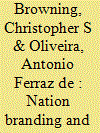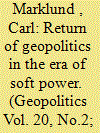| Srl | Item |
| 1 |
ID:
155448


|
|
|
|
|
| Summary/Abstract |
To date, (critical) geopolitics has had little to say about contemporary competitive identity practices of nation branding in global politics, while existing analyses of nation branding in other disciplines have tended to overlook its geopolitical dimensions. This expanded Introduction (and the special section as a whole) therefore seeks to explore some of the implications of nation branding for geopolitics, while simultaneously utilising the insights of critical geopolitics to shed light on nation branding practices. The Introduction makes the case for a broad conception of nation branding that challenges claims it is immutably linked to capitalist logics in an era of globalisation. It subsequently explores claims that nation branding is simply an updated form of nation building and that it is also an inherently benign and peace promoting activity. The Introduction ends by highlighting how, despite claims that the contemporary prevalence of nation branding practices is indicative of a categorical shift from a geopolitical to a geoeconomic world, nation branding practices frequently remain deeply infused with rather traditional geopolitical scripts.
|
|
|
|
|
|
|
|
|
|
|
|
|
|
|
|
| 2 |
ID:
138976


|
|
|
|
|
| Summary/Abstract |
This paper looks at how Swedish political scientist Rudolf Kjellén (1864–1922) conceived of the relationship between nature and culture, between material and immaterial power as well as the role of soft power, geopolitical imaginary and competitive identity in off-setting potentially unfavourable geopolitical conditions for small and medium-sized states. It is argued that with regard to small states, Kjellén did not maintain a consistent separation between “soft” cultural resources of power and “hard” laws of nature. Rather, he placed the mutually constitutive tension between geography (nature) and politics (culture) at the centre of his politico-scientific analysis, arguing that active “biopolitics” could supplement geopolitics. In Kjellén’s conception, cultural and natural resources are instruments of an otherwise integrated notion of power which challenges the contemporary separation between hard and soft power.
|
|
|
|
|
|
|
|
|
|
|
|
|
|
|
|